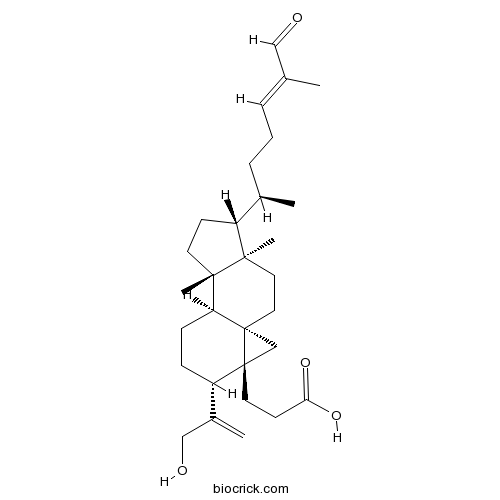Coronalolic acidCAS# 268214-52-4 |

Quality Control & MSDS
3D structure
Package In Stock
Number of papers citing our products

| Cas No. | 268214-52-4 | SDF | Download SDF |
| PubChem ID | 10648063 | Appearance | Powder |
| Formula | C30H46O4 | M.Wt | 470.7 |
| Type of Compound | Triterpenoids | Storage | Desiccate at -20°C |
| Solubility | Soluble in Chloroform,Dichloromethane,Ethyl Acetate,DMSO,Acetone,etc. | ||
| Chemical Name | 3-[(1S,4R,5R,8S,9S,12R,13R)-12-(3-hydroxyprop-1-en-2-yl)-4,8-dimethyl-5-[(E,2R)-6-methyl-7-oxohept-5-en-2-yl]-13-tetracyclo[7.5.0.01,13.04,8]tetradecanyl]propanoic acid | ||
| SMILES | CC(CCC=C(C)C=O)C1CCC2(C1(CCC34C2CCC(C3(C4)CCC(=O)O)C(=C)CO)C)C | ||
| Standard InChIKey | IOFXIXOKOAYADV-ICQJXUMVSA-N | ||
| Standard InChI | InChI=1S/C30H46O4/c1-20(17-31)7-6-8-21(2)23-11-13-28(5)25-10-9-24(22(3)18-32)29(14-12-26(33)34)19-30(25,29)16-15-27(23,28)4/h7,17,21,23-25,32H,3,6,8-16,18-19H2,1-2,4-5H3,(H,33,34)/b20-7+/t21-,23-,24+,25+,27-,28+,29-,30+/m1/s1 | ||
| General tips | For obtaining a higher solubility , please warm the tube at 37 ℃ and shake it in the ultrasonic bath for a while.Stock solution can be stored below -20℃ for several months. We recommend that you prepare and use the solution on the same day. However, if the test schedule requires, the stock solutions can be prepared in advance, and the stock solution must be sealed and stored below -20℃. In general, the stock solution can be kept for several months. Before use, we recommend that you leave the vial at room temperature for at least an hour before opening it. |
||
| About Packaging | 1. The packaging of the product may be reversed during transportation, cause the high purity compounds to adhere to the neck or cap of the vial.Take the vail out of its packaging and shake gently until the compounds fall to the bottom of the vial. 2. For liquid products, please centrifuge at 500xg to gather the liquid to the bottom of the vial. 3. Try to avoid loss or contamination during the experiment. |
||
| Shipping Condition | Packaging according to customer requirements(5mg, 10mg, 20mg and more). Ship via FedEx, DHL, UPS, EMS or other couriers with RT, or blue ice upon request. | ||
| Structure Identification | Int J Microbiol. 2014;2014:410935.Antibacterial Activities and In Vitro Anti-Inflammatory (Membrane Stability) Properties of Methanolic Extracts of Gardenia coronaria Leaves.[Pubmed: 24695677]
|

Coronalolic acid Dilution Calculator

Coronalolic acid Molarity Calculator
| 1 mg | 5 mg | 10 mg | 20 mg | 25 mg | |
| 1 mM | 2.1245 mL | 10.6225 mL | 21.245 mL | 42.4899 mL | 53.1124 mL |
| 5 mM | 0.4249 mL | 2.1245 mL | 4.249 mL | 8.498 mL | 10.6225 mL |
| 10 mM | 0.2124 mL | 1.0622 mL | 2.1245 mL | 4.249 mL | 5.3112 mL |
| 50 mM | 0.0425 mL | 0.2124 mL | 0.4249 mL | 0.8498 mL | 1.0622 mL |
| 100 mM | 0.0212 mL | 0.1062 mL | 0.2124 mL | 0.4249 mL | 0.5311 mL |
| * Note: If you are in the process of experiment, it's necessary to make the dilution ratios of the samples. The dilution data above is only for reference. Normally, it's can get a better solubility within lower of Concentrations. | |||||

Calcutta University

University of Minnesota

University of Maryland School of Medicine

University of Illinois at Chicago

The Ohio State University

University of Zurich

Harvard University

Colorado State University

Auburn University

Yale University

Worcester Polytechnic Institute

Washington State University

Stanford University

University of Leipzig

Universidade da Beira Interior

The Institute of Cancer Research

Heidelberg University

University of Amsterdam

University of Auckland

TsingHua University

The University of Michigan

Miami University

DRURY University

Jilin University

Fudan University

Wuhan University

Sun Yat-sen University

Universite de Paris

Deemed University

Auckland University

The University of Tokyo

Korea University
- Coronalolide
Catalog No.:BCN5152
CAS No.:268214-51-3
- Coronalolide methyl ester
Catalog No.:BCN5151
CAS No.:268214-50-2
- Udenafil
Catalog No.:BCC5213
CAS No.:268203-93-6
- Debilon
Catalog No.:BCN7696
CAS No.:26808-51-5
- Indapamide
Catalog No.:BCC4788
CAS No.:26807-65-8
- Dehydrodiisoeugenol
Catalog No.:BCN1240
CAS No.:2680-81-1
- Xanthatin
Catalog No.:BCN5150
CAS No.:26791-73-1
- Robtein
Catalog No.:BCN4658
CAS No.:2679-65-4
- Amoxicillin
Catalog No.:BCC4625
CAS No.:26787-78-0
- Alibendol
Catalog No.:BCC4758
CAS No.:26750-81-2
- Perivine
Catalog No.:BCN2583
CAS No.:2673-40-7
- Canertinib
Catalog No.:BCN2172
CAS No.:267243-28-7
- Harringtonine
Catalog No.:BCN6794
CAS No.:26833-85-2
- Homoharringtonine
Catalog No.:BCN4958
CAS No.:26833-87-4
- Triptohypol F
Catalog No.:BCN5154
CAS No.:268541-26-0
- Penfluridol
Catalog No.:BCC4696
CAS No.:26864-56-2
- 1,3-Bis[2-(4-aminophenyl)-2-propyl]benzene
Catalog No.:BCC8419
CAS No.:2687-27-6
- Isomahanimbine
Catalog No.:BCN3175
CAS No.:26871-46-5
- 6-Hydroxybenzofuran-2(3H)-one
Catalog No.:BCN5155
CAS No.:2688-49-5
- Oxysophocarpine
Catalog No.:BCN5156
CAS No.:26904-64-3
- 2(-4-Chloro-3-hydroxy-1-butynyl)-5-1,(3-pentadiynyl)thiophene
Catalog No.:BCN1465
CAS No.:26905-70-4
- Etravirine (TMC125)
Catalog No.:BCC5027
CAS No.:269055-15-4
- Fmoc-Orn(Dde)-OH
Catalog No.:BCC3534
CAS No.:269062-80-8
- H-D-Dab-OH.2HCl
Catalog No.:BCC3185
CAS No.:26908-94-1
Antibacterial Activities and In Vitro Anti-Inflammatory (Membrane Stability) Properties of Methanolic Extracts of Gardenia coronaria Leaves.[Pubmed:24695677]
Int J Microbiol. 2014;2014:410935.
This work is carried out with Gardenia coronaria leaves that belong to the family Rubiaceae, which is a small-to-medium-sized but tall, deciduous tree, 7.6-9 m high on an average. Leaves are used for the treatment of rheumatic pain and bronchitis. The leaf of the plant consists of coronalolide, Coronalolic acid, coronalolide methyl ester, ethyl coronalolate acetate triterpenes (secocycloartanes), and so forth. Methanol extract from the leaves of Gardenia coronaria was completely screened for membrane stability and antibacterial activity. The lower concentrations of Methanolic leaf extract of Gardenia coronaria gave good antimicrobial and anti-inflammatory activity, but higher concentrations gave relatively more projecting antibacterial activity in vitro as compared with Kanamycin. The crude drug's anti-inflammatory effects were compared with those of Aspirin as positive control. The Methanolic extracts of Gardenia coronaria leaves possessed a broad spectrum antibacterial activity against a variety of both Gram-negative and Gram-positive organisms like Streptococcus agalactiae, Escherichia coli, Pseudomonas aeruginosa, Bacillus cereus, Shigella sonnei, Shigella boydii, and Proteus mirabilis, with a zone of inhibition from 10 to 16 mm. The extract also showed good membrane stability to be considered as having significant anti-inflammatory action.


